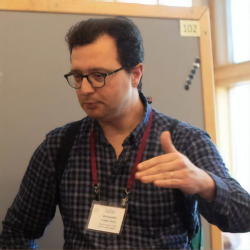Machine learning models for zoonotic disease surveillance
Computational genomic approaches for detecting and predicting zoonotic diseases from host and environmental DNA samples.
Start date
1 April 2024Duration
3.5 yearsApplication deadline
Funding source
Faculty of Health and Medical Sciences, University of Surrey and Animal and Plant Health AgencyFunding information
The studentship covers tuition fees, and a generous UKRI-level stipend for 3.5 years (£18,622 per annum), conference/training expenses (£1,000 per annum), approved University of Surrey fees and a research budget.
About
In this PhD project you will join a team of scientists from the University of Surrey and the UK Animal and Plant Health Agency (APHA) to develop novel bioinformatic approaches to detect and predict a type of infectious diseases termed zoonotic disease that can be transmitted between species, from animals to humans (and vice-versa).
The aim of the project is to integrate DNA sequence from samples routinely collected by the APHA with laboratory experimental data to detect with high accuracy the pathogen strain and predict their preferred animal host(s), and as such help the government to delineate strategies to prevent and control infectious disease outbreaks.
Together with our team of collaborators, you will develop novel computational methods to identify genetic signatures that predict phenotypic characteristics of pathogens such as strain, host reservoir, and host preferences. You will harness the power of the large APHA data bank of DNA sequences matched to pathogen phenotypes and outbreak characteristics to map at single nucleotide resolution the genetic makeup of pathogen outbreaks.
Our challenge is to develop novel predictive genetic models of infectious disease outbreak from whole genome sequencing and spatially resolved outbreak data. You will explore high-dimensional machine learning methods for prediction, as well as Bayesian statistical approaches for variable selection, phylogenetic clustering and spatially resolved models.
New technologies for whole genome sequencing are being actively developed, and the volume of sequencing data available is increasing exponentially. One of the challenges in this area is how to harness the high-dimensionality and sequential nature of DNA to build models that consider gene-by-gene interactions and other genetic phenomena to predict pathogen behaviour. Our project aims at addressing these challenges by developing methods that model complex nonlinear interactions between genes to accelerate the process of extracting key genetic features to identify pathogens and characterise outbreaks, and with these outcomes, help APHA inform UK government.
The project will be conducted at the University of Surrey, under the supervision of Drs. Alexessander Couto Alves and Jennifer Ritchie within the Surrey Artificial Intelligence Institute, the Bioinformatics Core Facility, and Drs Mark Arnold and Liljana Petrovska leading the mathematical modelling and genomic bacteriology teams at APHA. You will be integrated in a team of PhD students and bioinformatic scientists working on method development for genomic data analysis and you will have the opportunity for a placement at APHA accessing additional datasets and resources.
This project provides an excellent opportunity to develop skills in Artificial Intelligence, Bioinformatics, Genomics and Microbiology. The student will benefit from a vibrant and collegial environment with technical infrastructure and scientific expertise to provide training and support.
Interview date: 30 January, 9am-12noon.
Eligibility criteria
Open to candidates who pay UK/home rate fees. See UKCISA for further information.
Applicants should hold or expect to gain a minimum of a 2:1 Bachelor Degree, Masters Degree with Merit, or equivalent, in bioinformatics, data science, statistics, machine learning, artificial intelligence, computer science, mathematics, physics, biology, or a closely related life, environmental or physical science. The project will involve analysis of large data sets and some familiarity with programming, especially R or Python would be required. We will also consider candidates with different academic paths but with experience acquired from a research position, or equivalent, that is relevant to the topic of the PhD project.
You will need to meet the minimum entry requirements for our PhD programme.
How to apply
Applications should be submitted via the Biosciences and Medicine PhD programme page. In place of a research proposal you should upload a document stating the title of the project that you wish to apply for and the name of the relevant supervisor.
Biosciences and Medicine PhD
Studentship FAQs
Read our studentship FAQs to find out more about applying and funding.
Application deadline
Contact details

Studentships at Surrey
We have a wide range of studentship opportunities available.
